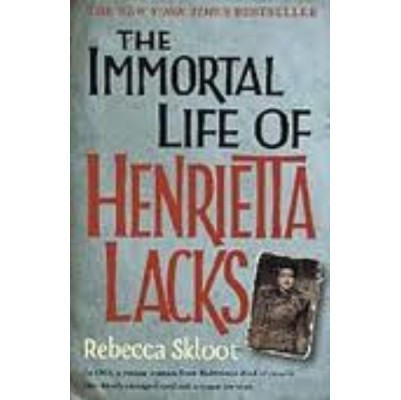When Henrietta Lacks, a poor African-American died in 1951, she and her family had been unaware that cancer cells were taken from her body and cultured. From the development of the polio vaccine, to the effects of radiation and to more recent work of gene mapping and cloning, these so called HeLa cells have revolutionised medical science and benefitted millions of people.
This is the story of Henrietta, her family and her immortal cells, generators of not only material for research, but large amounts of money. A fascinating and accessible read whether you are a scientific novice or guru.
Winner of the 2010 Wellcome Trust Book Prize. [Big read, larger font]
We all liked this book and it generated quite a bit of discussion about the ethical issues, the author and the Lacks family. Auckland 236
A well-researched story which created in-depth discussions and interest. Ohope 004
This was the highest rated book in the last 2-3 years. None of us were aware of the Hela cells and found the book very informative and quite fascinating. In spite of these comments it isn't an easy book to read, but well worth the effort. Rotorua 006
Very interesting. We would recommend it, but some thought it a bit long-winded. Lots of threads to discuss. Richmond 007
We all found Henrietta Lacks' story and the history of cell research development fascinating. A couple of us felt the author's style was overwritten and she tried to include too much. A great read. Wellington 178
Very much enjoyed. Learned lots. Auckland 107
TURA 002
09-05-2024
We all really enjoyed this book. An engaging read, and the conversation on ethics was wide ranging.
NELS 044
10-07-2023
Most had a high opinion of the book, especially the meticulous research by Rebecca Skloot into the history of cell research, the development of all the processes around this, and the ethical dilemmas presented by the taking of tissue samples with or without consent. By combining all this with the time getting to know Henrietta's family and the racial background informing all this, the writer brought this amazing story to light.
TAUR 059
11-04-2023
Everyone agreed this was an interesting and good read, some felt it got a bit text book in parts. The words harrowing, shocking and disturbing came up a lot in our inevitable discussion about the ethics of medical research & experiments. Most of us were uncomfortable with the realities of the human cost versus the benefits in testing not being undertaken that long ago. We all agreed the writer had done a great job in her portrayal of Deborah and her diction.
WELL 194
03-03-2023
An informative read that provided a good introduction to cell culture. The ethical issues raised led to much discussion.
AUCK 422
02-10-2021
An extraordinary and thought-provoking story, meticulously researched, dealing with confronting issues that are still topical today.
MARTIN 003
06-09-2021
We liked the way the chapters alternated between science and human interest. Kept us wanting to read on.
WHITBY 005
10-06-2021
Diverse opinions expressed leading to a great discussion. Several members rated the book very highly and others found it a struggle. We all respected the authors dedication in researching and documenting Henrietta's story. We learned a lot.
PAIHIA 001
16-11-2020
Most of us read this easily up to about half way and then struggled a bit to keep going. However it is an incredible story and many did finish it. We were amazed how far we have come in terms of informed consent since those days and the days of our very own 'Unfortunate Experiment' in NZ. We thought it was very thoroughly researched and the author really put a human face and family behind the science.
CHCH 058
01-11-2018
The book generated a lively discussion - all really appreciated such an amazing read. Words used were -"amazing, horrifying, scary and unputdownable". This story happened in our own lifetime and made us wonder about the next 50-60 years, about scientific research and human life. Scientific research is interwoven with an incredible black family and their medical experiences. The author has shown remarkable commitment, perseverance and patience over several years to produce a memorable book.
AUCK 063
01-11-2018
This was a very high scorer despite being a sizeable read. Only 1 of our 12 had heard of Hela cells, and was unaware of the incredible back story. Admirable research by, and devotion of author to Henrietta Lacks' story and her family. It was suggested that it should be required reading for any medical/pathology students! An eye-opener on many levels - cell research and ethics, medical care, content and racism - and all over 50 years. Some heated discussion arose from many different viewpoints and interpretations!
GOVER 001
01-11-2018
A powerful and thought provoking book about a powerless family and the powerful medical profession. Many of the power imbalances have been addressed, even if only partially, but there are many questions still to be answered. A wonderful vehicle for discussion!
AUCK 355
01-11-2018
Thoroughly enjoyed by members of the group, although some found parts slightly repetitive. We were disappointed that the family never got anything not even free medical care, after the news got out about the cells.
AUCK 354
01-11-2018
Everyone enjoyed the first half. Many felt it could have been half the length, and still just as good.
PALMN 002
01-11-2018
All the group enjoyed this book for its readability. The writer made complicated concepts easy to understand and interesting. The social circumstances of the Lacks family were discussed, but the ethical question of paying people for tissues/organs etc was debated, and the group agreed this could be open to terrible consequences. However we did agree that informed consent is now part of practice in NZ after the Cartwright inquiry.
MOSG 004
01-11-2018
We all enjoyed this book! Informative and historical... but still relevant today.




